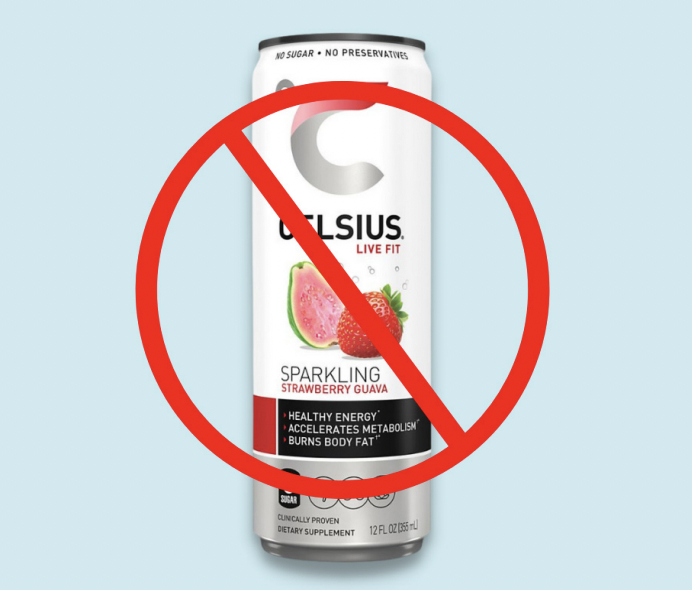NCAA Bans Celsius
April 26, 2022
Under the regulation of the 2021-2022 NCAA Banned Substance Policy, athletes will no longer be able to enjoy the popular energy drink Celsius. This drink, which was founded in 2004, has seen an explosion of sales in its target demographic, which is mainly college-aged females.
Despite popular opinion, this ban is not related to the caffeine content of the drink, which is a modest 200 mg (comparable to two regular-sized cups of coffee), but rather the presence of a substance that is subject to a total ban under the NCAA regulations: Guarana extract.
This substance, which is found in all flavors of Celsius energy drinks, is banned as a result of its potential to enhance athletic performance and grant an athlete a competitive advantage over fellow competitors. According to WebMD, Guarana is a stimulant that increases central nervous system activity and is often used by athletes to increase energy levels and athletic performance. However, little scientific data exists to support these uses.
Student athletes often turn to guarana and caffeine if they are struggling to balance extremely busy schedules as full-time students with athletic duties that include daily team functions. However, these substances only provide a short-term energy spike, which is usually followed by a variety of adverse side effects, including heart palpitations, energy crashes, insomnia, and feelings of anxiety.
GC athletic trainer Stacey Lampkin is troubled by this trend of fatigued student athletes turning to energy drinks for a brief boost. She believes that these drinks have a net negative impact on their health and that there are many healthier ways to address the problem of fatigue, including adequate sleep, a healthy diet, and proper hydration.
“I do not necessarily care for energy drinks in general,” Lampkin said. “I have seen people have heart palpitations and other things from caffeine use. Cardiovascular-wise, there are many better choices when you are trying to run and compete. Eating better, sleeping more, being in better condition…these are all better ways to find energy than energy drinks.”
Caffeine can be dangerous in high doses, especially for athletes in sports that require a high amount of cardiovascular activity. Its stimulating effects on nervous system activity give it the capacity to have detrimental effects on the heart health of athletes, especially if routinely misused or consumed in excess.
For these reasons, caffeine became a restricted substance under NCAA regulations and a substance that is tested for in random drug testing of student athletes. If an athlete’s urine test yields a concentration of more than 15 mcg/mL of caffeine, the student will fail the test and face disciplinary action from their program, which could include suspension from games and practices.
Despite more advanced urine testing technology, Lampkin doubts many athletes will fail a test as a result of caffeine intake, due to how quickly the substance is processed through one’s body as a result of its short five-hour half-life.
“It is hardly ever seen,” Lampkin said. “However, if your test does yield high levels of caffeine, it becomes extremely suspicious.”
Lampkin suggested that one would fail the test only as a result of habitual use of caffeine at alarmingly high levels.
GC soccer player Kate Richardson is frustrated by the ban of Celsius, despite not personally drinking the beverage. Overall, the junior goalkeeper is frustrated by the NCAA’s tightening of restrictions on what student athletes can consume.
“With all the pressure they put on athletes, you cannot expect us to get through the day without caffeine,” Richardson said. “Before the Celsius announcement, many of my teammates had one before every practice.”
Richardson uses hydration multipliers such as Liquid IV to keep electrolyte levels constant and energy levels stable throughout the day, instead of turning to energy drinks to meet the demands placed on her as a student athlete.
GC baseball player Ashton Sturgell fears that this ban will disrupt his gameday ritual of drinking an energy drink before the games he is expected to pitch in.
“It helps me get locked in and amped up for the game,” Sturgell said. “It has become part of my routine. I always get the same flavor.”
This superstitious routine has prepared the junior closing pitcher ahead of games for years now, and it has remained a personal tradition that allows him to focus mentally and physically. This season, Sturgell has recorded a remarkable 11 strikeouts.
With the recent ban of Celsius, one cannot help but wonder if more energy drinks are to follow. This trend is sure to have an impact on how such drinks are marketed and potentially modified in the future.




